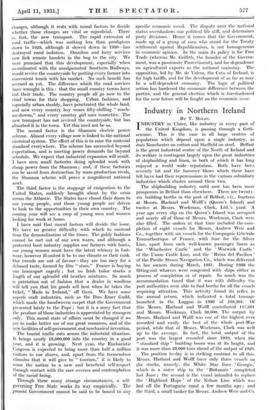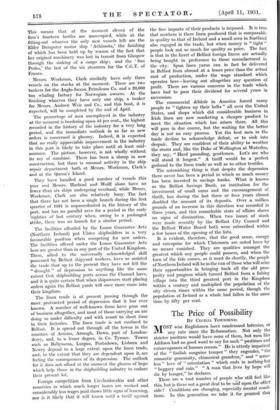Industry in Northern Ireland
BY T. MOLES.
INDUSTRY in Ulster, like industry in every part of the United Kingdom, is passing through a Geth- semane. This is the case in all large centres of population which depend upon a single industry, as does Manchester on cotton and Sheffield on steel. Belfast is the great industrial centre of the North of Ireland and its welfare is contingent largely upon the great industries of shipbuilding and linen, in both of which it has long enjoyed a world wide reputation. Both have •been severely hit and the hammer blows which these have felt have had their repercussions in the various subsidiary industries which cluster around these two.
The shipbuilding industry until now has been more prosperous in Belfast than elsewhere. There are twenty- six building berths in the port of Belfast, viz., fourteen at Messrs. Harland and Wolff's (Queen's Island) and twelve at Messrs. Workman, Clark, Ltd.'s yard. A year ago every slip on the Queen's Island was occupied and nearly all of those of Messrs. Workman, Clark were also filled. The orders at that time included the com- pletion of eight vessels for Messrs. Andrew Weir and Co., together with six vessels for the Compagnie Gerrirale Transatlantique of France, with four for the Silver Line, apart from such well-known passenger liners as the ' Winchester Castle ' and the ' Warwick Castle ' of the Union Castle Line, and the ` Reins del Pacifico of the Pacific Steam. Navigation Co., which was delivered to her owners during March, 1931. During 1980 the fitting-out wharves were congested with ships either in process of completion or of repair. So much was the accommodation taxed that it was with difficulty the port authorities were able to find berths for all the vessels requiring attention. This activity found its reflex in the annual return, which indicated a total tonnage launched in the Laggan in 1930 of 168,201. Of this Messrs. Harland and Wolff contributed 117,601 and Messrs. Workman, Clark 50,600. The output by Messrs. Harland and Wolff was one of the highest ever recorded and easily the best of the whole post-War period, while that of Messrs. Workman, Clark was well up to the average. In fact, the total. output of the port was the largest recorded since 1919, when the " standard ship " building boom was at its height, and it was more than 20,000 tons ahead of the output of 1929.
The position to-day is in striking contrast to all this. Messrs. Harland and Wolff have only three vessels on the stocks,"namely, the 'White Star liner ` Georgic,' which is a sister ship to the ` Britannic ' completed last June ; the second is the vessel intended to replace the ' Highland Hope ' of the Nelson Line which was lost off. the Portuguese coast a few months ago ; and the third, a small tanker for Messrs. Andrew Weir and Co. This means that at the moment eleven of the firm's fourteen berths are unoccupied, while at the fitting-out wharves the only new vessels left are the Elder Dempster motor ship Achimota,' the finishing of which has been held up by reason of the fact that her original machinery was lost in transit from Glasgow through the sinking of a cargo ship ; and the ' San Pedro,' the last of the six steamers for the C.G.T. of France.
Messrs. Workman, Clark similarly have only three vessels on the stocks at the moment. These are two tankers for the Anglo-Saxon Petroleum Co. and a 20,000 ton whaling factory for Norwegian owners. At the finishing wharves they have only one ship, a tanker for Messrs. Andrew Weir and Co., and this boat, it is expected, will be completed by the end of April.
The percentage of men unemployed in the industry at the moment is bordering upon 45 per cent., the highest recorded in the history of the industry for a very long period, and the immediate outlook in so far as new orders is concerned is gloomy. Indeed, it is expected that no really appreciable improvement in the industry in this port is likely to take place until at least mid- summer. The picture, however, is not wholly without its ray of sunshine. There has been a slump in new construction, but there is unusual activity in the ship repair department both at Messrs. Workman, Clark's and at the Queen's Island.
They have handled a good number of vessels this year and Messrs. Harland and Wolff alone have no fewer than six ships undergoing overhaul, while Messrs. Workman, Clark are also relatively busy. The fact that there has not been a single launch during the first quarter of 1931 is unprecedented in the history of the port, and has no parallel save for a period in the early 'eighties of last century when, owing to a prolonged strike, there was no launch for a similar period.
The facilities afforded by the Loans Guarantee Acts (Northern Ireland) put Ulster shipbuilders in a very favourable position when competing for new orders. The facilities offered under the Loans Guarantee Acts here are greater than in any part of the United Kingdom. These, allied to the universally acknowledged skill possessed by Belfast shipyard workers, have so assisted the trade that up to the present they have not felt the " draught " of depression to anything like the same extent that shipbuilding ports across the Channel have, and it is quite certain that when shipowners start placing orders again the Belfast yards will once more come into their kingdom.
The linen trade is at present passing through the most protracted period of depression that it has ever known. A number of well-known firms have gone out of business altogether, and most of those carrying on are doing so under difficulty and with resort to short time in their factories. The linen trade is not confined to Belfast. It is spread out through all the towns in the counties of Antrim, Armagh, Down, part of London- derry, and, to a lesser degree, in Co. Tyrone. Towns such as Ballymena, Lurgan, Portadown, Lisburn and Newry depend to a large extent upon the linen trade, and, to the extent that they are dependent upon it, are feeling the consequences of its depression. The outlook for it does not afford at the moment the gleams of hope which help those in the shipbuilding industry to endure their present lot.
Foreign competition from Czechoslovakia and other countries in which much longer hours are worked and considerably less wages paid shows little signs of lessening, nor is it likely that it will lessen until a tariff against the free imports of their products is imposed. It is true that nowhere is there linen produced that is comparable in quality to that of Ireland and a small area in Scotland also engaged in the trade, but when money is " tight " people look not so much for quality as price. The fact is that in the heart of Belfast foreign linens are actually being bought in preference to those manufactured in the city. Spun linen yarns can in fact be delivered in Belfast from abroad at a lesser price than the actual cost of production, under the wage standard which operates here—leaving out altogether any question of profit. There are various concerns in the trade which have had to pass their dividend for several years in succession.
The commercial &Mete in America forced many people to " tighten up their belts " all over the United States, and shops which did considerable business in Irish linen are now marketing a cheaper product to meet the situation which has arisen there. All this will pass in due course, but the waiting for the better day is not an easy process. Yet the best men in the trade decline to acknowledge defeat, or to sink into despair. They are confident of their ability to weather the storm and, like the -Duke of Wellington at Waterloo, they say, " Hard pounding, gentlemen. Let's see who will stand it longest." A tariff would be a- perfect godsend to the linen trade as well as to other textiles.
The astonishing thing is that despite the depression there never has been a period in which so much money has been invested in savings banks. What is known as the Belfast Savings Bank, an institution for the investment of small sums and the encouragement of thrift, has during the last three or four years almost doubled the amount of its deposits. Over a million pounds of an increase in this- direction was recorded in three years, and this remarkable state of affairs shows no signs of diminution. When two issues of stock were made recently by the Belfast City Council and the Belfast Water Board both were subscribed within a few hours of the opening of the lists.
It is evident, therefore, that the good sense, energy and enterprise for which Ulstermen are noted have by no means vanished. They are qualities amongst the greatest which any people could possess, and when the turn of the tide comes, as it must do shortly, the people of Northern Ireland will be in the van of those who will seize their opportunities in bringing back all the old pros- perity and progress which turned Belfast from a fishing village into the third greatest port in the Kingdom within a century and multiplied the population of the city eleven times within the same period, though the population of Ireland as a whole had fallen in the same time by fifty per cent.











































 Previous page
Previous page